Jewish parents are expressing outrage over a Toronto District School Board (TDSB) student census survey they say excludes Jewish identity and inadequately addresses rising antisemitism, leaving them questioning whether their children are truly seen or protected in the city’s public schools.
The census, sent to families with students from kindergarten to Grade 12, was designed to collect identity-based data under provincial ministry directive PPM 145, which mandates school climate surveys every two years to assess bullying, harassment, safety, well-being and belonging. But some Jewish parents contend it has the opposite effect—by omitting “Jewish” from the cultural or ethnic identity categories, leaving respondents to write it in. The survey also did not provide an example of antisemitic bullying.
“Jewish students deserve to be acknowledged, protected, and heard—not erased,” reads an automated letter campaign sent anonymously to several TDSB trustees by numerous Jewish community members. “This survey was meant to foster belonging. Instead, it sends a devastating message: that Jewish identity and Jewish pain do not count.”
Particularly criticized is the survey’s question about bullying which provides a single example: “If you are Muslim, a student might say mean things to you about wearing a hijab or praying.” There is no parallel mention of harassment faced by Jewish students who wear kippot or express their Jewish cultural or religious identity.
Tamara Gottlieb, co-founder of the Jewish Educators and Families Association (JEFA), echoed these frustrations: “This is another DEI (diversity, equity, inclusivity) initiative that erases Jewish identity. No one is surprised.”
Critics also raised alarm about the survey’s lack of anonymity. Students are required to input their names and student numbers to complete it—something that, according to the letter, may deter honest responses from those who already feel vulnerable. “Doing so might make them a further target,” it reads.
Aaron Kucharczuk, a Jewish father of three TDSB students—one of whom was a victim of antisemitic harassment earlier this year—also expressed deep frustration. He explained that in his son’s Grade 3 class, one student went from table to table harassing Jewish children with remarks such as “Jews suck,” “Jews kill babies” and “I hate Jews.”
Kucharczuk said he chose to opt out of the survey. “I thought it was outrageous that they would judge the inclusivity of schools while excluding my family and my children’s identity,” he said. “It was biased, and I didn’t want any part of it.”
The exclusion, Kucharczuk said, aligns with what he described as the TDSB’s broader failure to address antisemitism meaningfully. “The TDSB seems more concerned with geopolitics and Middle Eastern conflicts than protecting Jewish students,” he argued. He highlighted the TDSB’s delay and ultimate decision to unify its specific antisemitism strategy into a general anti-hate framework, effectively “kicking the can down the road for another three years,” despite rapidly escalating antisemitic incidents.
Recent data underscores Kucharczuk’s concerns. According to the TDSB Human Rights Annual Report for 2023-2024, there were 2,155 reported incidents of racism, bias or hate. Incidents based on creed or religion accounted for approximately 20 percent of these, with antisemitism the most frequent at 14.5 percent, up sharply from 10.4 percent the previous year. Numerically, antisemitic incidents surged from 211 incidents in 2022-2023 to 312 incidents in 2023-2024. This represents approximately one antisemitic incident for every 27 Jewish students in the TDSB.
Jewish students comprise three and a half percent of the population at the TDSB, with 8,359 Jewish students enrolled in a student population of 238,000, according to the school board.
Kucharczuk noted the prevalence of the problem. “Kids spend 14 years in the TDSB. In those 14 years, it’s more likely than not they’ll be victims of antisemitism under the TDSB’s care. And what has the TDSB done about it? I haven’t seen anything.”
The TDSB, responding to community backlash, acknowledged the concerns. Ryan Bird, the board’s spokesperson, stated in an email, “We recognize the complexity of Jewish identity and acknowledge that the available options have upset some community members.” He explained that census questions align with provincial data standards from the Ontario Anti-Racism Directorate (ARD). “If a person does not see themselves in the provided options, they’re encouraged to use the ‘use your own word’ space,” Bird added.
However, critics insist that asking Jewish students to self-identify separately only reinforces their invisibility.
Emma Moynihan, communications advisor with the TDSB, clarified further in an email to The CJN, stating: “Under Ministry directive PPM 145, all school boards must administer a climate survey every two years, but there isn’t a mandated specific survey. Boards develop surveys that must address bullying, harassment, safety, well-being and belonging.”
Despite these assurances, Kucharczuk pointed to persistent misunderstandings of Jewish identity within the board. “They fail to recognize Judaism as an ethno-religion, alienating many who identify culturally rather than religiously,” he explained. “The board’s inability to capture this nuance reinforces exclusion. They don’t seem to understand or even attempt to understand the complexity of Jewish identity.”
The Jewish community remains particularly frustrated with the TDSB’s broader strategy. In February 2021, facing escalating antisemitism, the board announced plans for a targeted antisemitism strategy. Yet, after extensive consultation with Jewish organizations, the board decided instead to consolidate the strategy into a generalized anti-hate initiative. This move, critics argue, dilutes specific efforts needed to combat antisemitism effectively.
“While they continue delaying, the problem worsens,” Kucharczuk added. “It seems almost intentional—like they don’t want to deal with antisemitism at all.”
In the meantime, the community letter calls for explicit reforms: inclusion of “Jewish” in both religious and ethnic identity categories, examples reflecting Jewish experiences in questions about religious bullying, and ensuring the option to complete the survey anonymously.
“A tool intended to address bullying and bias cannot itself marginalize a vulnerable community,” concludes the community letter. “Excluding a minority that experiences more hate crimes than any other religious group in Canada is not equity—it’s abandonment.”
Author

Mitch is The CJN's campus and education reporter based in Toronto, Ont. He has a passion for investigative research, long-form feature writing and digital journalism. His book, Home Safe, was published by Dundurn Press in November 2022.
View all posts








